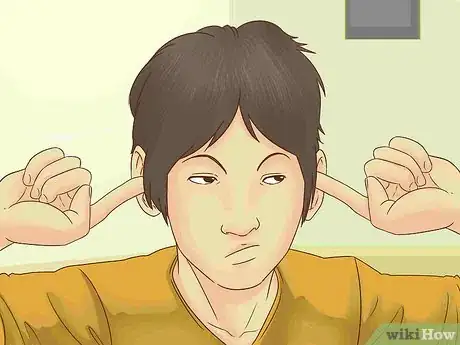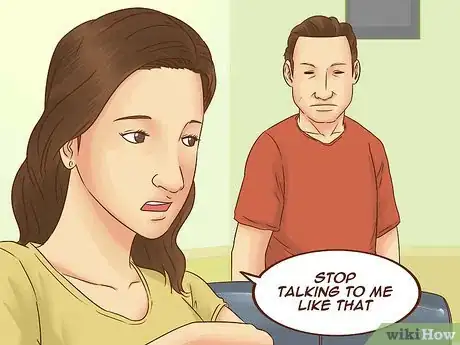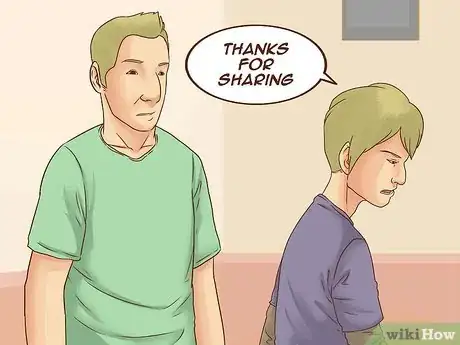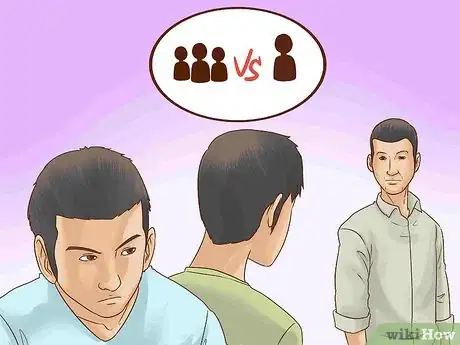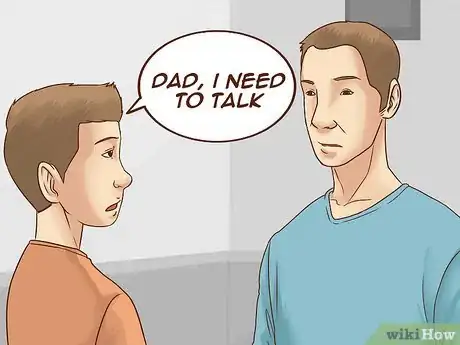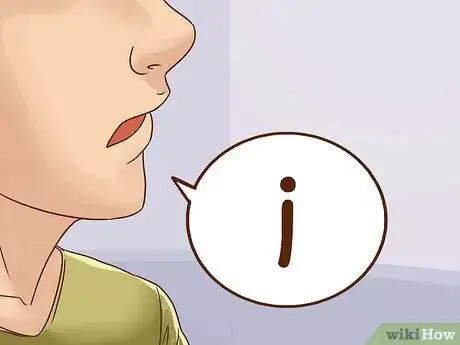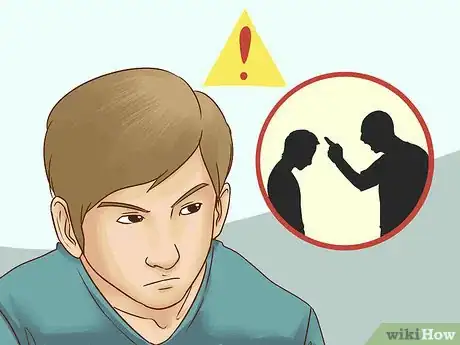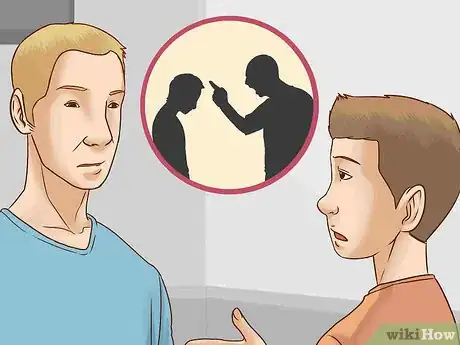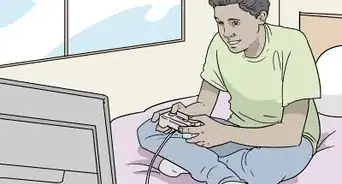This article was co-authored by Paul Chernyak, LPC. Paul Chernyak is a Licensed Professional Counselor in Chicago. He graduated from the American School of Professional Psychology in 2011.
There are 8 references cited in this article, which can be found at the bottom of the page.
This article has been viewed 90,452 times.
If your dad picks on you, this can be stressful. Your dad may tease you about things like school, your friends, and your appearance. He may also be quick to anger, and yell at you for small mistakes. If your dad's picking on you, in the immediate moment you can ignore it, ask your dad to stop, or think of a comeback. You should work on discussing the situation with other family members. Talk to another adult, like another parent, about how your dad makes you feel. Have a sit down talk with your dad when he's calm, and tell him directly that his behavior bothers you. In the future, work towards a healthy relationship by keeping communication open.
Steps
Coping in the Moment
-
1Ignore it. Sometimes, the best way to deal with someone messing with you is to ignore it. Your dad may thrive off the response he gets from you. He may think it's amusing to see you annoyed, so try to not indulge him.[1]
- When your dad starts picking on you, just pretend you do not hear him. If he persists in picking on you, simply walk away.
- Acting like you don't care may bore your dad. If he thinks it's funny to see you get mad, he'll lose interest if you just ignore his behavior. This can be a good way to get him to stop in the moment.
-
2Stand up for yourself. You can also try telling your dad to stop. It's possible your dad does not realize he's bothering you. It's also possible your dad has never been confronted about his behavior before, so he doesn't think he needs to stop. Try standing up for yourself in the moment and see if your dad stops picking on you.[2]
- Be assertive without being aggressive. Do not raise your voice, but simply say in a stern manner, "Stop talking to me like that."
- After you ask your dad to stop, walk away from the situation.
- While this can be a good technique, if your dad has a temper, you may want to take a different route. You do not want to escalate the situation.
Advertisement -
3Think of a comeback. You can also try thinking of a comeback to the teasing to make it clear you cannot be intimidated. If your dad makes fun of your hair, for example, say something like, "Thanks for sharing" and then walk away. Try to look relaxed when the teasing occurs, so you appear unbothered by your dad picking on you.[3]
- As with confronting your dad, however, be careful. If your dad has a temper, you do not want to risk making him angry and potentially escalating the situation.
-
4Find strength in numbers. If you have siblings, strength in numbers can help you stop getting picked on. Try to stick around your siblings when your dad is around. You and your sibling can work on ignoring or standing up to your dad together. He may feel uncomfortable if he's outnumbered.[4]
Discussing the Situation with Your Family
-
1Talk to another adult about the issue. If your father is making you uncomfortable, you may want to talk it over with another adult. Your other parent, for example, may be able to help mediate the situation so you feel more comfortable. If you're unable to talk to your other parent, try talking to another relative, such as aunt or uncle, or the parent of a friend.[5]
- Another adult can help you sort out your feelings. If you want to talk the problem over with your dad, another adult can help you figure out how to best bring up how your dad makes you feel.
- Tell another adult exactly how your dad is picking on you. You can also tell them how the behavior makes you feel. For example, "I don't like it when dad yells at me when I don't do my chores. The way he talks to me makes me feel insecure and scared and I wish he would stop."
-
2Wait until your dad is calm to discuss the issue. This is especially important if your father has temper problems. Confronting your dad in the moment he's picking on you may backfire. He may get angry and double down on his aggression. Wait until your dad is calm to raise the issue.[6] [7]
- Do you know a time when your father is generally in a good mood? This may be a good time to talk with him. For example, maybe your father is always in good spirits when he gets home from bowling with his friends.
- You may want to let your dad know you want to talk ahead of time, so he has a head's up. If your dad has a busy schedule, he may need to carve out some time to have a discussion. You can say something like, "Dad, I need to talk to you sometime this week about something that's bothering me. Can you let me know when is good for you?"
-
3Open the conversation honestly. You should let your dad know exactly how you feel about the way he treats you. Be honest and give precise details. It's important your dad understands how you feel about the situation.[8] [9]
- Avoid sounding accusatory. Do not open the discussion with something like, "Dad, I hate how you're always yelling at me." This will make you sound hostile, and your dad may become defensive.
- Instead, start with something like, "Dad, I don't feel like we always get along as well as we should, and I don't like that. I would like to work on fixing this."
-
4Use "I" statements to express your feelings. It can help to use an "I" statement when telling your dad how his behavior affects you. This is a statement phrased in a way to emphasize personal feelings. This way, it feels less judgmental. Instead of offering an objective assessment of the situation, you're merely saying how the situation makes you feel.
- An "I" statement has three parts. It begins with "I feel..." after which you immediately state your feeling. Then, you state the action that led to that feeling. Lastly, you explain why you feel the way you do.
- For example, you may be inclined to say something like, "You yell all the time about my grades because you think I'm stupid. It's really mean because you know I try hard." This sounds very hostile, and it could put your dad on the defense right away.
- You can use an "I"-statement to better express that feeling. For example, say something like, "I feel hurt when you yell at me about my grades because I feel like you're saying I'm stupid, when I'm trying my best in school."
-
5Listen to your dad's perspective. Give your dad a chance to talk as well. You want to hear his take on the situation, and understand where he's coming from. While it is never okay to make a child feel uncomfortable or hurt, your father may have reasons for behaving the way he does. Understanding him better can help you empathize, and make it easier to forgive your father and move forward.[10]
- Listen to what your father has to say. He may have many reasons for picking on you. He may be stressed at work, or he may simply not realize how the behavior was making you feel. For example, your father may say something like, "I thought it was just lighthearted teasing. I didn't realize it was hurting your feelings."
- If your father is receptive to what you are saying, he will hopefully offer an apology and an explanation. The two of you can move forward towards a healthy relationship.
Moving Towards a Healthier Relationship
-
1Talk to your dad regularly. A good relationship is built on open communication. As you and your dad try to foster a healthier relationship, work on talking to him every day.[11]
- Find time to talk every day. You can talk to your dad at the dinner table, or after he gets home from work. You do not always have to have a serious discussion. You can simply talk about your day at school.
- If your dad did something to hurt your feelings, make sure to let him know. You want to make sure he knows if he's continuing to pick on you and upset you.
-
2Ask your parents about family counseling if the situation does not improve. It's possible your dad may not improve. Your dad may have problems with anger or stress management. You may need to see a family counselor to figure out how to best address the issue and form a healthier family dynamic.
- You may want to talk to a counselor at your school before talking to your parents. Your counselor can help advise you on how to bring up family counseling, and may even be able to talk to your parents for you.
-
3Watch for warning signs of emotional abuse. Parents screw up sometimes, and may accidentally pick on their children. However, if your dad is routinely making you uncomfortable, you may be the victim of emotional abuse. It's important to figure out if you are being emotionally abused so you can take action to end the abuse.
- Your dad may ignore you when you do not behave the way he wants. He may not look at you or call you by name.
- Your dad may prevent you from seeing friends. He may not allow you to have a normal social life. This is to keep you isolated and away from others.
- Your dad may talk to you in a way that is traumatizing. He may ridicule you or curse at you. He may call you things like "stupid" or "worthless." He may also do things to scare you, like placing a pet or a sibling in a dangerous situation.
-
4Seek help from a trusted adult if you are being abused. It's important you tell someone about abuse, as it can be very damaging over the longterm. Emotional abuse may also eventually turn into physical abuse. Tell another adult relative, the parent of a friend, or a trusted teacher or counselor at school what is going on. These adults should be able to find you the resources you need to get away from an abusive situation.[12] [13]
- If you do not have an adult you feel you can trust, try calling Childhelp USA. This is an organization that seeks to help children who are being physically or emotionally abused by a parent. You can call at (800) 4-A-CHILD.
Warnings
- If you feel you are being emotionally abused, it's very important you tell a trusted adult. Emotional abuse can cause serious psychological damage longterm.⧼thumbs_response⧽
References
- ↑ http://kidshealth.org/en/kids/bullies.html#
- ↑ http://kidshealth.org/en/kids/bullies.html#
- ↑ https://www.loveandlogic.com/articles-advice/tease-proof-your-kids-helping-children-deal-with-teasing
- ↑ http://kidshealth.org/en/kids/bullies.html#
- ↑ http://pbskids.org/itsmylife/advice/parent_problems15.html#a
- ↑ http://pbskids.org/itsmylife/advice/parent_problems15.html#a
- ↑ http://pbskids.org/itsmylife/advice/parent_problems26.html#a
- ↑ http://kidshealth.org/en/kids/talk-parents.html#
- ↑ http://pbskids.org/itsmylife/advice/parent_problems26.html#a
About This Article
It can be hurtful when your dad picks on you, but by learning how to cope, you can get through it. It may be hard, but try to ignore your dad when he picks on you, since acting like you don’t care may make your dad lose interest in teasing you. If you have siblings, stick around them, so your dad has fewer chances to pick on you. Alternatively, you can tell your dad to stop. You could say something direct like, “Please don’t talk to me that way.” It's best to talk to your dad about the issue when he's in a good mood, so he'll be more receptive. If he doesn’t stop, or if you’re scared to confront him, talk to another adult about the issue, like another family member or a teacher. It's never okay for your parent to pick on you, so don't be afraid to get help. They’ll be able to help mediate and stop the hurtful teasing. To learn how to make your relationship with your dad healthier in the long run, read on.
